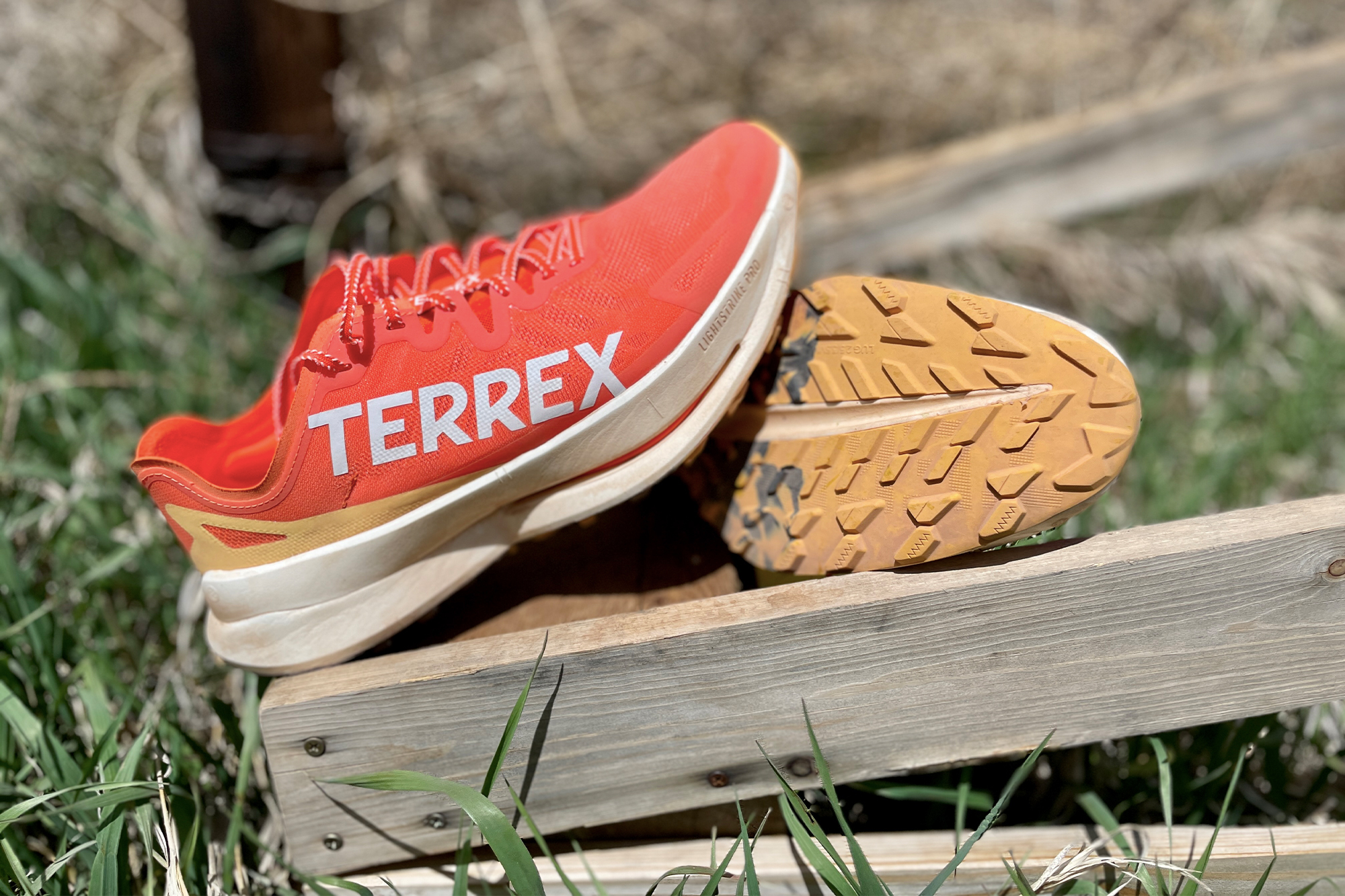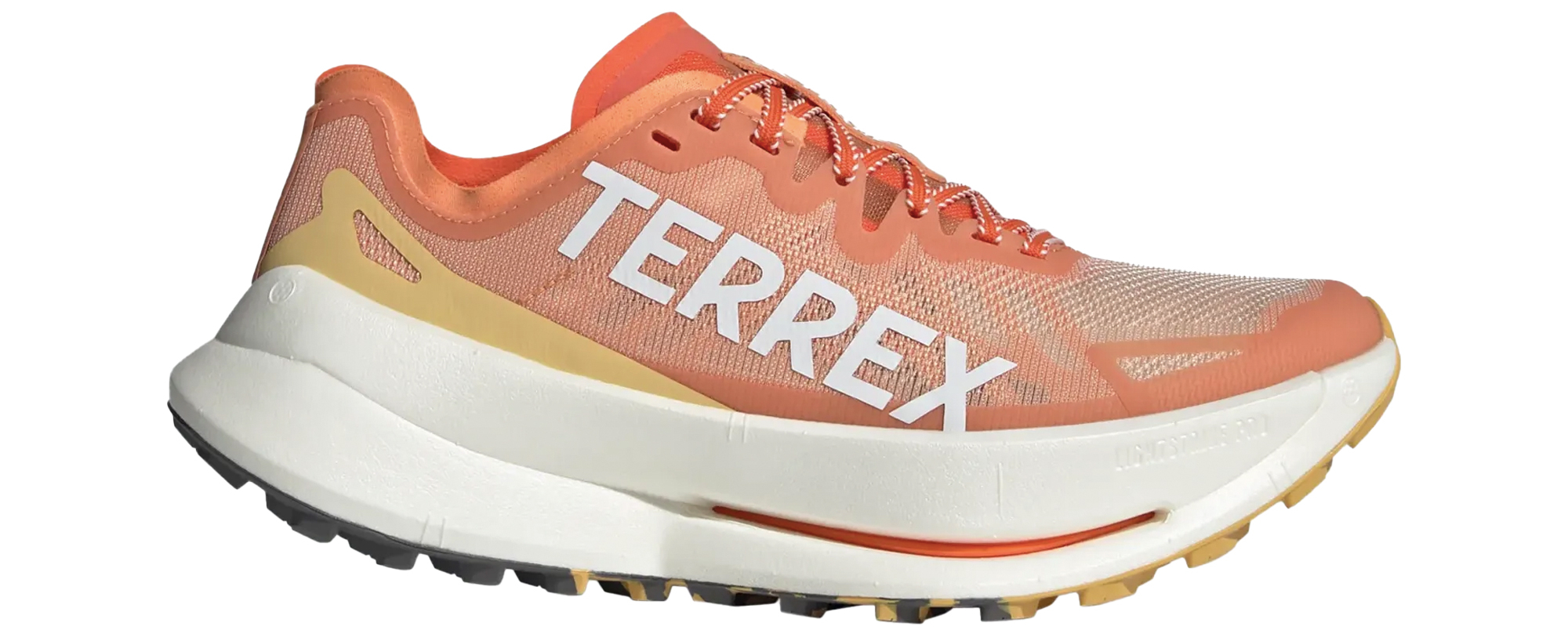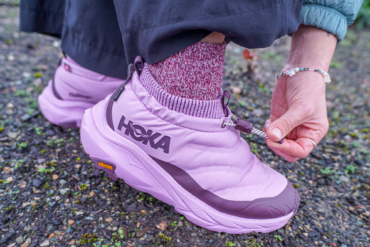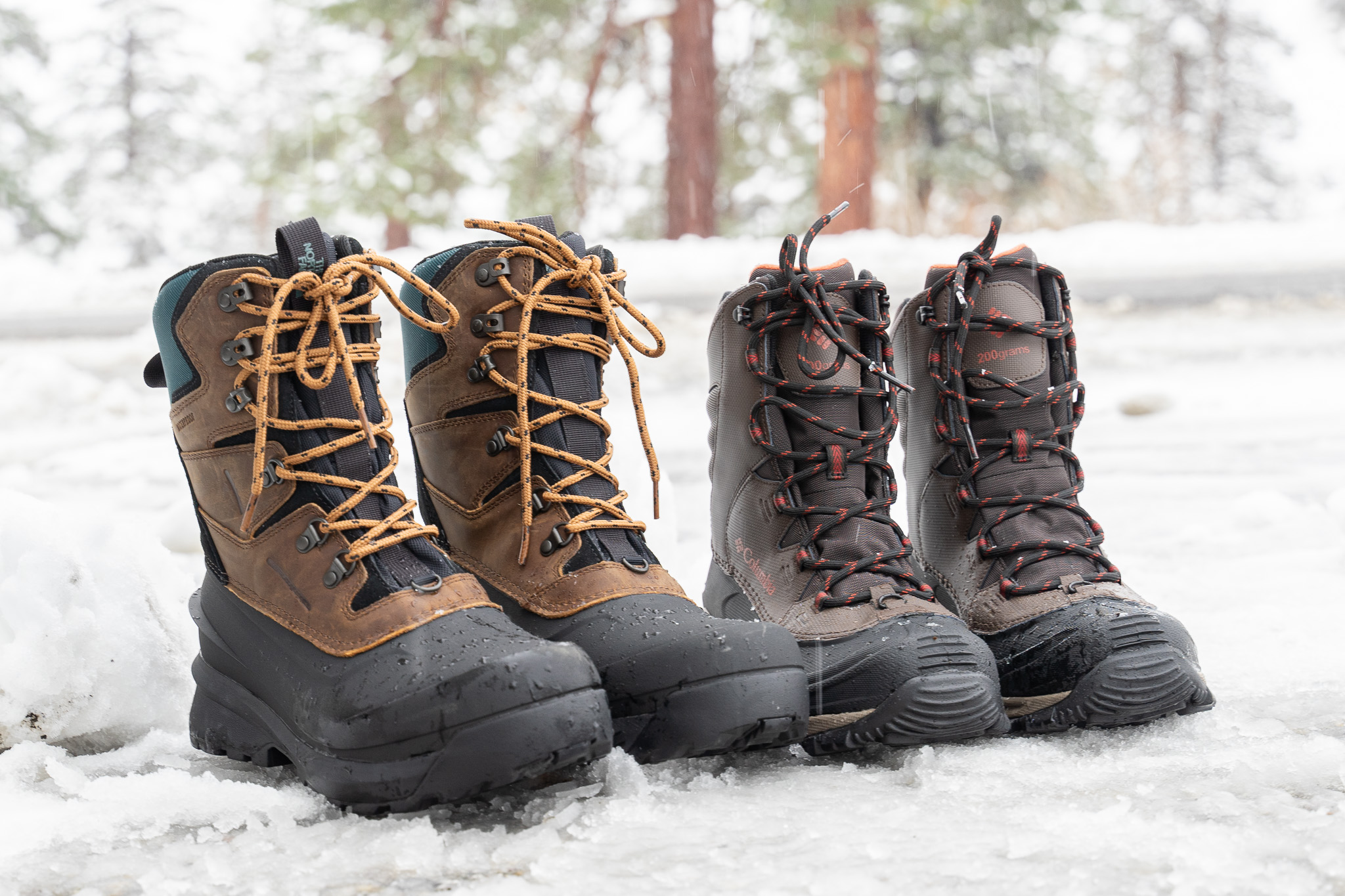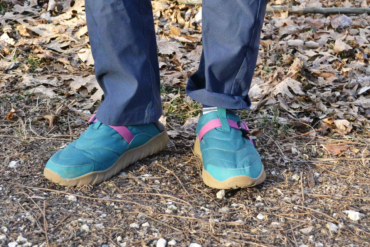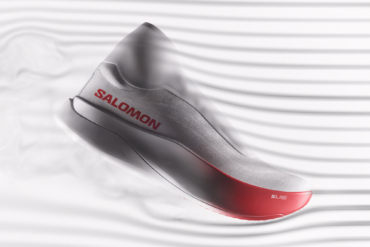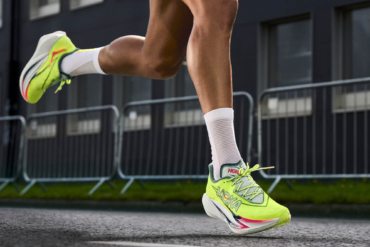If you haven’t run in a trail super shoe yet, it’s time to get on board. Brands like Nike, HOKA, The North Face, and now adidas are making it difficult for core trail running brands to compete with a shoe you’ll not just want to race in, but do all of your training in, too.
Adidas spent a lot of time tooling a trail shoe around the same qualities that make its marathon super shoes so successful. Records are falling consistently in road running, and adidas predicts its first trail super shoe will have the same cascading effect on the trail racing scene; in some way,s it already has.
Maybe the anticipation was more pronounced with this shoe (after Tom Evans’ victory with it at Western States in 2023), but the lead-up to its release seemed longer. Adidas gave a few lucky shoe reviewers early access in person at UTMB last year, stirring general rancor among the rest of us.
So this week, while the ultra-expensive adidas Adipro Zero Evo 1 claimed another win in the Boston Marathon, a knock on the door from UPS delivered me a pair of the Agravic Speed Ultra — a shoe that shares as much with Sisay Lemma’s race-winning shoe (and the Adios Pro shoes that came before it) as any adidas trail shoe to date.
In short: The incredible bounce in the midsole foam and straight-line speed from carbon fiber — and now with stability being less of an issue — all means that if you want to run fast, there is no reason to avoid a shoe like the new adidas Terrex Agravic Speed Ultra.
- Materials: Woven upper with overlays, sawtooth edge laces, dual-layer Lightstrike Pro midsole, Energy Rods (PEBA), Continental rubber outsole
- Midsole height: 42mm heel to 34mm toe
- Midsole drop: 8mm
- Lug height: 2.5mm center lugs; 3mm edge lugs
- Weight: 9.5 oz. (men’s size 9)
- Price: $220
- First available: April 15, 2024
Pros
- Midsole is very bouncy and delays fatigue
- Best outsole on any trail super shoe to date
- Energy Rod technology provides energy transfer for fast running
- Minimum of 20% recycled and renewable materials
Cons
- Expensive
- Descending over difficult terrain can take practice, might inspire less confidence for less practiced runners
adidas TERREX Agravic Speed Ultra Review
Because the genre of trail super shoes is still less mature than the category’s road counterparts, it helps to take wisdom from road runners about how super shoes are changing the sport.
For 5 years, records have been falling from the mile to the marathon, and a greater number of runners are hitting marks that were historically uncommon. Road runners remark on the virtuous circle of the super shoe: the ability to regularly run faster creates better performances, more forgiving foam compounds create faster recovery that leads to more training, faster times, and on and on.
Coaches in trail running have cautioned training exclusively in super shoes because of the stability issues inherent in the terrain and, more plainly, they cost on average about $60-80 more and are, in turn, more costly to replace.
But in terms of biomechanics, super shoes provide value by reducing the impact on your muscles. This is in part due to the commonly used rocker shape, but mainly because of their highly resilient midsoles.
So, as a shoe tester (a very grateful one at that!), I have the fortune to buck this conventional coaching wisdom and tackle all of my training in super shoes. As a result, I can personally attest to the comfort, quickness, and overall feel from day to day that they provide.
The Competition: Vectiv Pro 2
The best shoe I’ve used all year has been The North Face Vectiv Pro 2 with its new “Dream” midsole, a nitrogen-infused, super-bouncy carbon rocket that has rendered other shoes from some familiar brands far less inviting.
The shoe was developed with TNF athletes who immediately used it successfully in big races like the UTMB. The outsole proved its only downfall; it lacks grip around corners and left me a little wary on tricky descents. And because of its rocker and stack height, it can be hard to control.
While the ride in both shoes felt similarly inviting, the Agravic Speed Ultra takes over the top position in my shoe rotation for one reason: the more thoughtfully designed, Continental-backed outsole.
Plus, the shoe is just a tad less tippy-feeling than the Vectiv Pro 2, and the forefoot is a little more pronounced — this gives the sensation of having more surface on which to land.
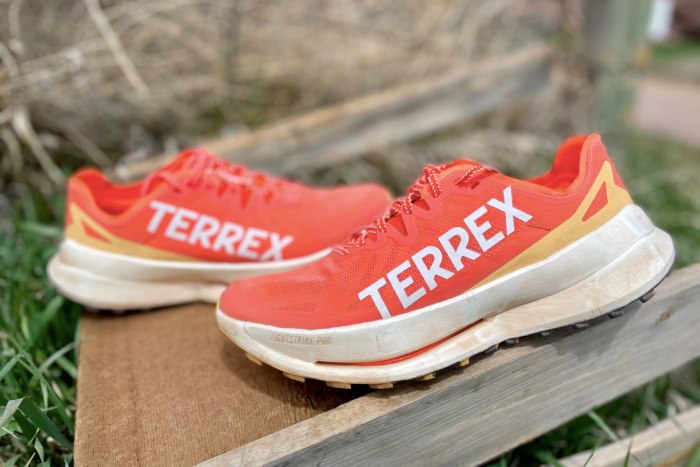
Comparing adidas Super Shoes: Agravic Speed Ultra vs. Evo 1
Materially, the Agravic Speed Ultra has the same dual-layer Lightstrike Pro foam and adidas Energy Rods (a PEBA composite with prongs). But unlike its road shoes, the Agravic Speed Ultra has four prongs (compared to five in the Evo 1), and they are spaced closer to the lateral and medial sides of the midsole to increase stability. The heel loop is also disconnected and has two prongs that give greater adaptability.
Where the Evo 1’s outsole is paper-thin for unobstructed glide over pavement, the Agravic Speed Ultra has a very sticky and aggressive Continental rubber outsole with 2.5mm center lugs and 3mm edge lugs.
The stack height on both shoes is in line with the industry trend. This trail super shoe has 42 mm in the heel and 34 mm in the toe for an 8mm drop.
The futuristic-looking Evo 1 has a whopping 11 mm of drop (39 mm in the heel and 28 mm in the toe). The comparisons start to ebb when you look at build quality and weight — the Evo 1 is ~4 ounces, while the Agravic Speed Ultra more than doubles that at 9.1 ounces.
The fact remains, though, that adidas took much of what made its road super shoes so successful and adapted it for the trail. And it should not go unnoticed that the Agravic Speed Ultra costs less than half what the Evo 1 costs, and it should last much, much longer.
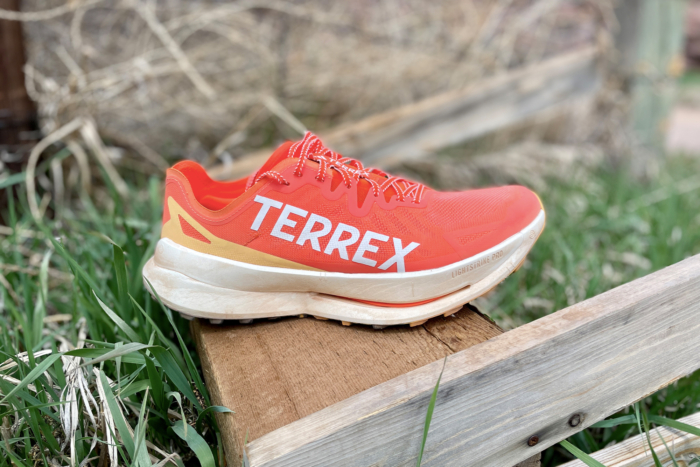
Testing Impressions
A couple days before the Agravic Speed Ultra arrived, I had finished an hour-long race pace workout. By the time the super shoes were in my possession, I still needed more recovery time. Needless to say, it took all of my resolve to not do a favorite loop of mine— the Hall Ranch loop — at full speed on my first run in the Agravic Speed Ultra.
The loop, just southwest of Lyons, Colorado, is the perfect course for these shoes. The 10-mile auburn dirt and desert plateau is largely smooth, gains about 1,500 feet of elevation, and is mostly non-technical, except for the final 2 miles down a super classic, mountain-bike oriented rock garden.
The power transfer from the Ultra’s Energy Rods shines on runnable, straight-ahead routes like 8 of the 10 miles on Hall Ranch. Since there isn’t much side-to-side or off-camber trail, you can open your legs and use your aerobic engine, soaking up the speed advantages inherent in super shoes. This is a route I’ve PR’d and snagged the Strava Course Record in wearing other supershoes (the Nike Ultrafly and aforementioned TNF Vectiv Pro 2).
The final push for this loop down the rock garden presents problems for many supershoes; pronounced rocker and stack height conspire to make lateral movement and big boulder leaps rather scary. The Vectiv Pro 2, for as much as I love the midsole and general performance, really suffers in this rock garden.
But the Agravic Speed Ultra proved a much more confident performer. The wider toe box, accommodating upper, and specifically the shoe’s last, allows your foot to connect to the ground much better than the Vectiv Pro 2.
But it’s not perfect. Make no mistake, these shoes’ real drawback is technical running. There is a reason the shoe has had success on the fast and runnable Western States course; it’d be a much different story at Italy’s Trofeo Kima or Montana’s The Rut — or countless other real mountain running races. For those, you will probably want to grab your La Sportivas.
Terrex Agravic Speed Ultra: Who Should Buy
Most of the mystique and prestige in trail running lie in 100-mile races, so it’s no surprise that adidas’s new pinnacle shoe aligns with those events. The longer-lasting comfort from the midsole, indeed, is beneficial too.
But for those of us who compete in much shorter races, this shoe will still be highly coveted. Though this super shoe carries a premium price, adidas concurrently released a lighter, less expensive, and more short-distance-oriented option: the Terrex Agravic Speed. It has a lot in common with the Speed Ultra, but lacks the Ultra’s speed secret — the Energy Rod tech.
Perhaps it’s fate that the Agravic Speed Ultra came out on Tax Day this year. If Uncle Sam was kind to you, consider investing that refund in a pair of these trail super shoes. But be warned, the “super shoe effect” might forever change your opinion and preferences in footwear.
While the added cost presents a barrier, the boost to your enjoyment will be staggering.
